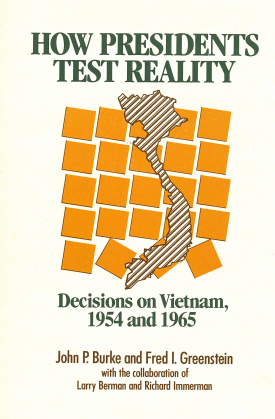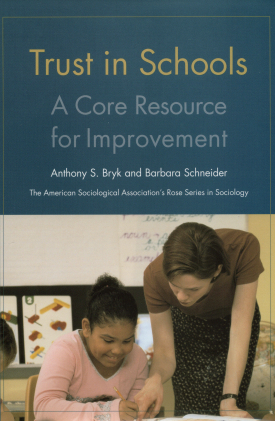
How Presidents Test Reality
About This Book
Just as famines and plagues can provide opportunities for medical research, the unhappy course of United States relations with Vietnam is a prime source of evidence for students of American political institutions. How Presidents Test Reality draws on the record of American decision making about Vietnam to explore the capacity of top government executives and their advisers to engage in effective reality testing.
Authors Burke and Greenstein compare the Vietnam decisions of two presidents whose leadership styles and advisory systems diverged as sharply as any in the modern presidency. Faced with a common challenge—an incipient Communist take-over of Vietnam—presidents Eisenhower and Johnson engaged in intense debates with their aides and associates, some of whom favored intervention and some of whom opposed it. In the Dien Bien Phu Crisis of 1954, Eisenhower decided not to enter the conflict; in 1965, when it became evident that the regime in South Vietnam could not hold out much longer, Johnson intervened.
How Presidents Test Reality uses declassified records and interviews with participants to assess the adequacy of each president’s use of advice and information. This important book advances our historical understanding of the American involvement in Vietnam and illuminates the preconditions of effective presidential leadership in the modern world.
"An exceptionally thoughtful exercise in what ‘contemporary history’ ought to be. Illuminates the past in a way that suggests how we might deal with the present and the future." —John Lewis Gaddis
"Burke and Greenstein have written what amounts to an owner's manual for operating the National Security Council....This is a book Reagan's people could have used and George Bush ought to read." —Bob Schieffer, The Washington Monthly
JOHN P. BURKE is associate professor of political science at the University of Vermont.
FRED I. GREENSTEIN is professor of politics at Princeton University and director of the Program in Leadership Studies at the Woodrow Wilson School of Public and International Affairs.
Download
RSF Journal
View Book Series
Sign Up For Our Mailing List
Apply For Funding

Trust in Schools
About This Book
A Volume in the American Sociological Association’s Rose Series in Sociology
Most Americans agree on the necessity of education reform, but there is little consensus about how this goal might be achieved. The rhetoric of standards and vouchers has occupied center stage, polarizing public opinion and affording little room for reflection on the intangible conditions that make for good schools. Trust in Schools engages this debate with a compelling examination of the importance of social relationships in the successful implementation of school reform.
Over the course of three years, Bryk and Schneider, together with a diverse team of other researchers and school practitioners, studied reform in twelve Chicago elementary schools. Each school was undergoing extensive reorganization in response to the Chicago School Reform Act of 1988, which called for greater involvement of parents and local community leaders in their neighborhood schools. Drawing on years longitudinal survey and achievement data, as well as in-depth interviews with principals, teachers, parents, and local community leaders, the authors develop a thorough account of how effective social relationships—which they term relational trust—can serve as a prime resource for school improvement. Using case studies of the network of relationships that make up the school community, Bryk and Schneider examine how the myriad social exchanges that make up daily life in a school community generate, or fail to generate, a successful educational environment. The personal dynamics among teachers, students, and their parents, for example, influence whether students regularly attend school and sustain their efforts in the difficult task of learning. In schools characterized by high relational trust, educators were more likely to experiment with new practices and work together with parents to advance improvements. As a result, these schools were also more likely to demonstrate marked gains in student learning. In contrast, schools with weak trust relations saw virtually no improvement in their reading or mathematics scores.
Trust in Schools demonstrates convincingly that the quality of social relationships operating in and around schools is central to their functioning, and strongly predicts positive student outcomes. This book offer insights into how trust can be built and sustained in school communities, and identifies some features of public school systems that can impede such development. Bryk and Schneider show how a broad base of trust across a school community can provide a critical resource as education professional and parents embark on major school reforms.
ANTHONY S. BRYK is Marshall Field IV Professor of Urban Education and Sociology, University of Chicago.
BARBARA SCHNEIDER is professor of sociology and human development, University of Chicago.
